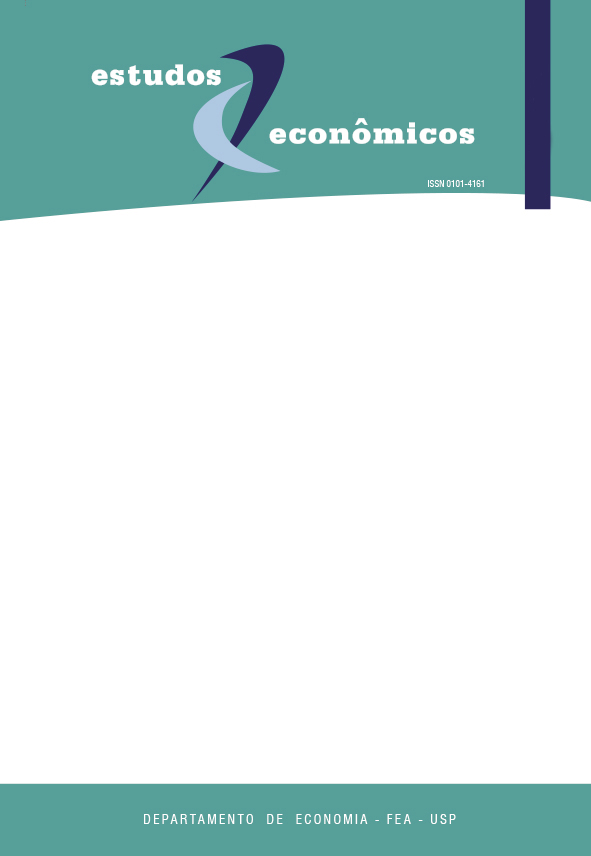The components of economic freedom, income and growth: an empirical analysis
DOI:
https://doi.org/10.1590/S0101-41612007000300003Palavras-chave:
liberdade econômica, crescimento, Granger, causalidadeResumo
Este artigo procura trazer um melhor entendimento da relação entre crescimento econômico e os fatores que constituem os elementos da liberdade econômica. Os dois principais objetivos do artigo são: (1) baseados no modelo neoclássico aumentado de crescimento, testar quais dos elementos componentes da liberdade econômica demonstram ter uma relação estatisticamente significante com crescimento; e (2) estabelecer para que lado ocorre a principal direção de causalidade entre liberdade econômica e crescimento. Finalmente, nós identificamos direções desejáveis para novas pesquisas e implicações para política econômica.Downloads
Referências
Ayal, Eliezer B.; Karras Georgios. Components of economic freedom and growth:
an empirical study. Journal of Developing Areas 32, p. 327-38, Spring 1998.
Berggren, N. Economic freedom and equality: friends or foes? Public Choice, v. 100, n. 3/4, p. 203–23, 1999.
Easton, Stephen T; Walker, Michael A. Income, growth, and economic freedom. American Economic Review, American Economic Association, v. 87, n. 2, p. 328-32, May 1997.
Esposto, A.; Zaleski, P. Economic freedom and the quality of life. Constitutional Political Economy, 10, p. 185-197, 1999.
Farr, W.; Lord, R.; Wolfewnbarger, J. Economic freedom, political freedom, and economic
well-being: a causality analysis. The Cato Journal, v. 18, n. 2, Fall 1998.
Friedman, Milton. Economic freedom, human freedom, political freedom. Speech delivered
at The Smith Center for Private Enterprise Studies, Hayward: California State
University, 1991.
Gwartney, James; Lawson, Robert. Economic freedom of the world: 2004 annual report.
Vancouver: The Fraser Institute, 2004. Data retrieved from www.freetheworld.com.
Gwartney, James; Lawson, Robert; Holcombe, Randall. Economic freedom and
the environment for economic growth. Journal of Institutional and Theoretical Economics, v. 155, n. 4, p. 1-21, 1999.
Haan, Jakob de; Siermann, Clemens L. J. Further evidence on the relationship between
economic freedom and economic growth. Public Choice, v. 95, n. 3-4, p.363-80, June 1998.
Heston, Alan; Summers, Robert; Aten, Bettina. Penn World Table Version 6.1. Center
for International Comparisons at the University of Pennsylvania (CICUP), October 2002.
Mankiw, N. Gregory; Romer, David; Weil, David N. A contribution to the empirics
of economic growth. NBER Working papers series n. 3541, 1992.
Norton, Seth W. Poverty, property rights, and human well-being: a cross-national
study. Cato Journal, v. 18, n. 2, p. 233-45, Fall 1998.
Smith, Adam. [1776] An inquiry into the nature and causes of the wealth of nations.
University Of Chicago Press, 1977. Reprinted.
Solow, Robert M. A contribution to the theory of economic growth. Quarterly Journal
of Economics, p. 65-94, February 1956.
Wu, Wenbo; Davis, Otto A. Economic freedom and political freedom. Forthcoming
in Encyclopedia of Public Choice, 2005.
Wu, Wenbo; Davis, Otto A.The two freedoms, economic growth and development: an empirical study. Public Choice, v. 100, n. 1/2, p. 39–64, July 1999.
Downloads
Publicado
Edição
Seção
Licença
Direitos autorais (c) 2007 Raphael B. Corbi

Este trabalho está licenciado sob uma licença Creative Commons Attribution-NonCommercial 4.0 International License.
A submissão de artigo autoriza sua publicação e implica o compromisso de que o mesmo material não esteja sendo submetido a outro periódico.
A revista não paga direitos autorais aos autores dos artigos publicados.





 Atualizado em 30/01/2026
Atualizado em 30/01/2026